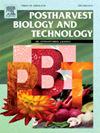Fine localization and functional differentiation of exocarp cell clusters during fruit senescence revealed by single-cell and spatial transcriptomics
IF 6.4
1区 农林科学
Q1 AGRONOMY
引用次数: 0
Abstract
The differentiation trajectories of 13 cell clusters in H. undatus during senescence have been revealed by single-cell transcriptome (scRNA-seq) analysis, and the five cell clusters in the exocarp have been found to induce resistance mainly. However, the precise localization and functional differentiation of these five cell clusters remain unclear. In this study, phenotypic changes in the exocarp were recorded, and the ROS production and flavonoid biosynthesis in the exocarp were elucidated. The trajectories of the cell clusters involved in exocarp function were further revealed in scRNA-seq profiles. Through integrated analysis of scRNA-seq and spatial RNA-seq data at resolutions of 0.5, 0.6, and 1.5, using algorithms SingleR, SciBet, CARD, and RCTD, the fine localization of these clusters from the outer to inner layers was achieved. RNA-FISH was used to validate the specific expression of marker genes HuSP2 and HuCEL2 in different locations of the exocarp. Finally, the differentiation trajectories of the five cell clusters were analyzed by selecting highly correlated cells with specific functions for each cluster. The core roles of HuPRP and HuCRRSP55 in the gene regulatory networks of exocarp clusters were revealed. A hypothesis that the five clusters in the exocarp participate in the induction of resistance was proposed.
单细胞和空间转录组学揭示果实衰老过程中外果皮细胞簇的精细定位和功能分化
单细胞转录组(scRNA-seq)分析揭示了H. undatus在衰老过程中13个细胞簇的分化轨迹,发现外果皮中的5个细胞簇主要诱导抗性。然而,这五个细胞簇的精确定位和功能分化仍不清楚。本研究记录了外果皮的表型变化,并阐明了外果皮中 ROS 的产生和黄酮类化合物的生物合成。scRNA-seq图谱进一步揭示了参与外果皮功能的细胞群的轨迹。通过使用SingleR、SciBet、CARD和RCTD算法对分辨率为0.5、0.6和1.5的scRNA-seq和空间RNA-seq数据进行综合分析,实现了这些细胞簇从外层到内层的精细定位。利用 RNA-FISH 验证了标记基因 HuSP2 和 HuCEL2 在外果皮不同位置的特异性表达。最后,通过为每个细胞簇选择具有特定功能的高度相关细胞,分析了五个细胞簇的分化轨迹。揭示了HuPRP和HuCRRSP55在外果皮细胞簇基因调控网络中的核心作用。提出了外果皮中的五个细胞簇参与抗性诱导的假说。
本文章由计算机程序翻译,如有差异,请以英文原文为准。
求助全文
约1分钟内获得全文
求助全文
来源期刊

Postharvest Biology and Technology
农林科学-农艺学
CiteScore
12.00
自引率
11.40%
发文量
309
审稿时长
38 days
期刊介绍:
The journal is devoted exclusively to the publication of original papers, review articles and frontiers articles on biological and technological postharvest research. This includes the areas of postharvest storage, treatments and underpinning mechanisms, quality evaluation, packaging, handling and distribution of fresh horticultural crops including fruit, vegetables, flowers and nuts, but excluding grains, seeds and forages.
Papers reporting novel insights from fundamental and interdisciplinary research will be particularly encouraged. These disciplines include systems biology, bioinformatics, entomology, plant physiology, plant pathology, (bio)chemistry, engineering, modelling, and technologies for nondestructive testing.
Manuscripts on fresh food crops that will be further processed after postharvest storage, or on food processes beyond refrigeration, packaging and minimal processing will not be considered.
 求助内容:
求助内容: 应助结果提醒方式:
应助结果提醒方式:


